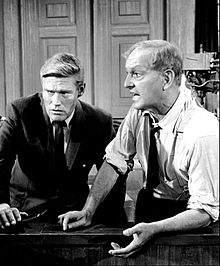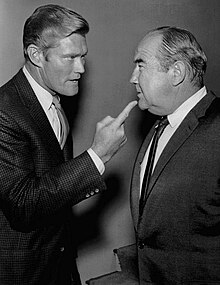| Arrest and Trial | |
|---|---|
 Chuck Connors as John Egan and guest star Joseph Schildkraut as his client Chuck Connors as John Egan and guest star Joseph Schildkraut as his client | |
| Genre | Crime/legal drama |
| Starring | |
| Theme music composer | Bronisław Kaper |
| Composer | Franz Waxman |
| Country of origin | United States |
| Original language | English |
| No. of seasons | 1 |
| No. of episodes | 30 |
| Production | |
| Executive producer | Frank P. Rosenberg |
| Producers |
|
| Camera setup | Single-camera |
| Running time | 90 mins. |
| Production company | Universal Television |
| Original release | |
| Network | ABC |
| Release | September 15, 1963 (1963-09-15) – September 6, 1964 (1964-09-06) |

Arrest and Trial is a 90-minute American crime/legal drama series that ran during the 1963-1964 season on ABC, airing Sundays from 8:30-10 pm Eastern.
Overview
The majority of episodes consists of two segments. Set in Los Angeles, the first part ("The Arrest") followed Detective Sergeants Nick Anderson (Ben Gazzara) and Dan Kirby (Roger Perry) of the Los Angeles Police Department as they tracked down and captured a criminal. The apprehended suspect was then defended in the second part ("The Trial") by criminal attorney John Egan (Chuck Connors), who was often up against Deputy District Attorney Jerry Miller (John Larch) and his assistant, Barry Pine (John Kerr, who later became an actual lawyer).
Gazzara agreed to play the role of Anderson only after extracting a promise from the producer that scripts would avoid stereotypical depictions of police officers.
In a 1963 TV Guide interview, Gazzara described his portrayal of Anderson: "I'm supposed to be a thinking man's cop. I'm a serious student of human behavior, more concerned with what creates the criminal than how to punish him. In other words, I'm not the kind of cop who asks, 'Where were you the night of April 13th?' It's my job to show that there is room for passion and intellectualism and personal display even within a policeman."
Arrest and Trial debuted on September 15, 1963. Its last telecast was on April 19, 1964, with reruns continuing until September 6, 1964. On April 24, 1964, it became the first American import to be broadcast on the UK's BBC2.
The same premise was adopted decades later by a more financially successful series, Law & Order, although the second half trial portion is focused on the prosecutorial side for that series, rather than the defense.
Cast
- Ben Gazzara as Detective Sgt. Nick Anderson
- Chuck Connors as Attorney John Egan
- Roger Perry as Detective Sgt. Dan Kirby
- John Kerr as Barry Pine
- John Larch as Deputy D.A. Jerry Miller
- Joe Higgins as Jake Shakespeare
Episodes
| No. | Title | Directed by | Written by | Original release date | |
|---|---|---|---|---|---|
| 1 | "Call It a Lifetime" | John Brahm | Herb Meadow | September 15, 1963 (1963-09-15) | |
| A truck driver in pursuit of cargo thieves fatally drives off the road a motorcycle policeman he had previously threatened. | |||||
| 2 | "Isn't It a Lovely View" | Jack Smight | Don Brinkley (based on a story by David Friedkin and Morton Fine) | September 22, 1963 (1963-09-22) | |
| A man is stabbed on a bench outside an amusement park, unraveling a dark tale of industrial espionage and blackmail. A disabled woman who spends hours looking at the surroundings from a nearby building à la Rear Window claims she did not see anything... or did she? | |||||
| 3 | "Tears from a Silver Dipper" | Arthur H. Nadel (also producer) | Sy Salkowitz | September 29, 1963 (1963-09-29) | |
| A soldier of Mexican ethnicity is accused of theft and murder against a backdrop of prejudice. | |||||
| 4 | "A Shield is for Hiding Behind" | David Lowell Rich (also producer) | John McGreevey | October 6, 1963 (1963-10-06) | |
| Sgt. Anderson kills in self-defense a gang member suspected of murdering a policeman, but is put on trial for second-degree murder. Only the gang member's kid brother knows the truth, but he can't bring himself to tarnish the idealized image of his sibling in the eyes of his parents. | |||||
| 5 | "My Name is Martin Burnham" | Ralph Senensky | Larry Cohen | October 13, 1963 (1963-10-13) | |
| A construction worker is brought in for questioning about assaults on women in his neighborhood. Although a victim directly exonerates him, the experience leaves him shaken. Incapable of returning home to face his family, he attempts to commit suicide by jumping from the skyscraper under construction where he used to work; but it is the foreman - responsible for firing him - who struggled to stop him who falls down the building. He is put on trial for first-degree murder, where he is determined to secure the death penalty for himself. | |||||
| 6 | "A Flame in the Dark" | Arthur H. Nadel | Richard Fielder | October 20, 1963 (1963-10-20) | |
| 7 | "Whose Little Girl Are You?" | Jack Smight | Paul Mason and Kenneth M. Rosen (based on a story by Rosen) | October 27, 1963 (1963-10-27) | |
| 8 | "The Witnesses" | Alex March | Max Ehrlich | November 3, 1963 (1963-11-03) | |
| 9 | "Inquest Into a Bleeding Heart" | David Lowell Rich | Antony Ellis | November 10, 1963 (1963-11-10) | |
| 10 | "The Quality of Justice" | Sydney Pollack | Howard Rodman | November 17, 1963 (1963-11-17) | |
| 11 | "We May Be Better Strangers" | David Lowell Rich | Halsted Welles | December 1, 1963 (1963-12-01) | |
| 12 | "Journey into Darkness" | Jack Smight | Alfred Brenner | December 8, 1963 (1963-12-08) | |
| 13 | "Some Weeks Are All Mondays" | Lewis Allen | Teleplay by Barry Trivers Story by Bill Ballinger and Barry Trivers | December 15, 1963 (1963-12-15) | |
| 14 | "Run, Little Man, Run" | Richard Irving | Herb Meadow | December 22, 1963 (1963-12-22) | |
| 15 | "Funny Man with a Monkey" | Ralph Senensky | Jerome Ross | January 5, 1964 (1964-01-05) | |
| 16 | "Signals of an Ancient Flame" | Earl Bellamy | Teleplay by Donald Brinkley Story by Herbert A. Spiro | January 12, 1964 (1964-01-12) | |
| 17 | "Onward and Upward" | Herman Hoffman | Mark Rodgers | January 19, 1964 (1964-01-19) | |
| 18 | "An Echo of Conscience" | Lewis Milestone | Teleplay by William Woolfolk and Franklin Barton Story by William Woolfolk | January 26, 1964 (1964-01-26) | |
| 19 | "Somewhat Lower Than the Angels" | William Claxton | Robert Crean | February 2, 1964 (1964-02-02) | |
| 20 | "People in Glass Houses" | Alan Crosland, Jr. | Antony Ellis | February 9, 1964 (1964-02-09) | |
| 21 | "The Best There Is" | Leon Benson | Herb Meadow, Richard Levinson & William Link | February 16, 1964 (1964-02-16) | |
| 22 | "A Roll of the Dice" | David Lowell Rich | Abel Kandel | February 23, 1964 (1964-02-23) | |
| 23 | "The Black Flower" | Earl Bellamy | Don Brinkley | March 1, 1964 (1964-03-01) | |
| 24 | "A Circle of Strangers" | Lewis Allen | Franklin Barton | March 8, 1964 (1964-03-08) | |
| 25 | "Modus Operandi" | David Lowell Rich | Jerome D. Ross and Don Brinkley | March 15, 1964 (1964-03-15) | |
| 26 | "Tigers Are for Jungles" | Bernard Girald | George Kirgo | March 22, 1964 (1964-03-22) | |
| 27 | "The Revenge of the Worm" | Charles S. Dubin | Ben Maddow | March 29, 1964 (1964-03-29) | |
| 28 | "He Ran for His Life" | Elliot Silverstein | Teleplay by Don Brinkley Story by Mark Rodgers | April 5, 1964 (1964-04-05) | |
| 29 | "Those Which Love Has Made" | Alex March | Mann Rubin | April 12, 1964 (1964-04-12) | |
| 30 | "Birds of a Feather" | Robert Butler | John McGreevey | April 19, 1964 (1964-04-19) | |
Guest stars
Awards
Arrest and Trial earned four Emmy nominations in 1964. Two were for Martine Bartlett and Anjanette Comer for Outstanding Performance in a Supporting Role by an Actress, one was for Roddy McDowall for Outstanding Performance in a Supporting Role by an Actor, and the other was for Danny Landres, Milton Shifman and Richard Wray for Outstanding Achievement in Film Editing for Television.
Home media
On November 22, 2011, Timeless Media Group released Arrest and Trial- The Complete Series on DVD in Region 1. The 10-disc set features all 30 episodes of the series.
See also
- Dragnet (1951–59) – NBC drama series (produced by Jack Webb) that followed the Arrest and Trial format.
- The D.A. (1971–72) – short-lived NBC drama series (produced by Jack Webb) that followed the Arrest and Trial format, and is also owned by NBC Universal.
- Law & Order (1990–2010, 2022-) – NBC drama series (produced by Dick Wolf) that also followed the Arrest and Trial format, and is also owned by NBC Universal.
- Arrest & Trial (2000) – syndicated docudrama series also produced by Wolf
References
- Durslag, Melvin. (1963, October 12–18). The Egghead Flatfoot. TV Guide, pp. 8–11.
Footnotes
- ^ Brooks, Tim; Marsh, Earle (2007). The Complete Directory to Prime Time Network and Cable TV Shows 1946–Present (9 ed.). New York: Random House Publishing. p. 78. ISBN 978-0-345-49773-4. Retrieved 2024-06-04.
- Berard, Jeanette M.; Englund, Klaudia (2009). Television Series and Specials Scripts, 1946-1992: A Catalog of the American Radio Archives Collection. McFarland. p. 17. ISBN 978-0-786-45437-2.
- Wrongly attributed to Lewis Milestone on the Internet Movie Database. See: Meyer, Janet L. (1998). Sydney Pollack: A Critical Filmography. McFarland. p. 209. ISBN 9780786404865.
- "Emmy Nominations 1964". www.emmys.com. Archived from the original on 2 April 2015. Retrieved 5 March 2015.
- "Arrest and Trial DVD news: Announcement for Arrest and Trial - the Complete Series | TVShowsOnDVD.com". Archived from the original on 2012-04-10. Retrieved 2011-10-21.
External links
Categories:- 1963 American television series debuts
- 1964 American television series endings
- 1960s American crime drama television series
- 1960s American legal drama television series
- Black-and-white American television shows
- American English-language television shows
- Fictional portrayals of the Los Angeles Police Department
- Television series by Universal Television
- Television shows set in Los Angeles
- American Broadcasting Company crime dramas